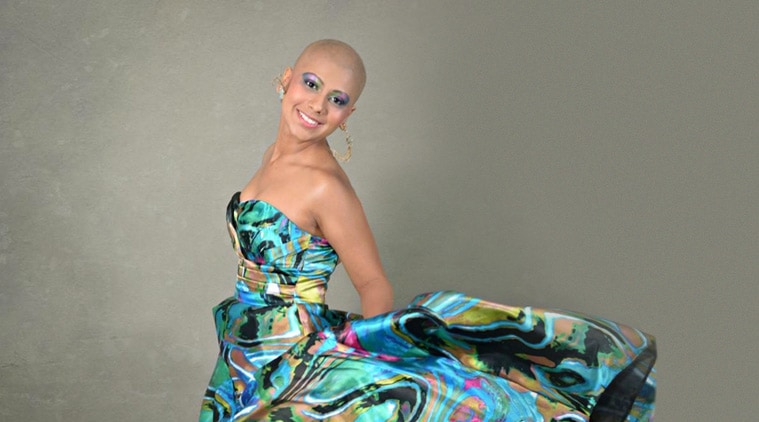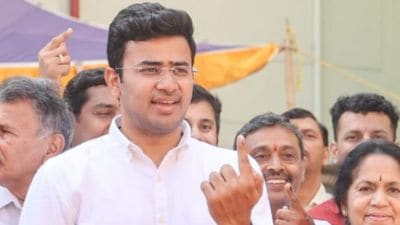- India
- International
‘Disbelief, acceptance and celebration’: Women on hair loss during cancer
Hairfall is an important and often an inevitable side-effect of cancer treatment. It affects everyone differently.
 Acceptance comes in varied stages but it does.
Acceptance comes in varied stages but it does.
When Tanisa Dhingra was diagnosed with ovarian cancer in 2016, she did not want to lose her hair. “That was my only concern,” the 26-year-old cancer survivor admits. She always had long hair, the shortest ever was till her shoulder. The prospect of losing all of that was terrifying and also seemed implausible. When her chemotherapy started and for the first 13 days there was no sign of hair fall, she had almost started believing it will not happen to her. On the 14th day, she noticed some more strands of hair on her comb. Then some more. It was harmless, the fall. “There were some strands on the pillow, some on the pillow.” The fall kept increasing, and finally she decided to go for a haircut. She was being treated in the US and there was a salon within the premise. She got a bob cut and she left the place with a smile. “I never had such short hair but I think it was really suiting me,” she recollects. The ordeal was not over yet. After 20-25 days, when she was washing her hair, her hair did not stop falling. By the end of it, she noticed a thick ball of hair.
Hairfall is an important and often an inevitable side-effect of cancer treatment. “It happens with radiation and chemotherapy. With radiotherapy, the site of treatment is on the scalp area so there is hair fall. With chemotherapy, there are selective chemotherapy drugs that cause hair fall, not all,” Dr Anil Kumar M R, Lead Consultant Radiation Oncology, Fortis Hospital, Bangalore accedes. Although he reassures it grows back within three to four months after treatment, he also admits that it carries within it an emotional component, affecting patients, especially women, gravely.
For Shormistha Mukherjee, director at a digital agency and survivor of breast cancer, coming to terms with hair fall was a struggle. Accepting her new self also entailed re-recognising the older her, coming to terms to her insecurities. “I was surprised how much it affected me, that so much of my self-esteem was reliant on my hair. You know we all have our good and bad hair days but you don’t expect something like this, till it actually happens. She sought a way around it to make the ease the eventual hurt. She got a crew cut. “I did it so that when my hair falls, it would not come as a shock to me.” But it did.
 Shormistha Mukherjee during her treatment.
Shormistha Mukherjee during her treatment.
Forty-one-year-old Anju Ghosh fought with a similar sense of disbelief. When she was told she was suffering from breast cancer and might lose her hair, it came as a shock but, she discloses, “I did not have the impression that I will be completely bald.” The effect started showing after the first chemotherapy when there would be strands of hair in her hands when she would as much as lightly run her fingers on them. Much like Mukherjee, she decided to go for a crew cut. By the third chemotherapy, she called a barber at home and shaved off her hair.
ALSO READ | World Cancer Day 2020: Here’s when the risk of cancer relapse is the highest

Acceptance for all of them, despite the varying levels of feeling betrayed, came in stages. For Dhingra, the final plunge of cutting off all her hair and subsequently gathering the courage to look at herself in the mirror brought it forth. The unfamiliarity lasted only for a brief while. “It took me some time but after that I felt the same. I felt like nothing has changed.” She soon started wearing colourful bandanas and experimented with different styled wigs.
 Tanisha Dhingra during a photoshoot conducted for cancer patients in the US.
Tanisha Dhingra during a photoshoot conducted for cancer patients in the US.
Mukherjee, 46, freely shares how looking at the mirror was difficult and how helpless she was with envy. “I went through a period of feeling extreme jealousy of my friends. Everyone looked so nice,” Mukherjee confesses. She would avoid meeting people and remembers the one time her colleagues had video-called her and she felt being seen “extremely difficult”. It took her a while. “I started to deal with it by my fourth chemotherapy, Once I looked at the mirror and realised this will not go away, I started working on it. I joined pottery classes to keep my mind off things.” Later, she donned cancer cap turbans five times during her nine months of treatment. The feisty spiritedness of Ghosh during the treatment — she was called ‘the happy patient’ at AIIMS — translated in the way she dealt with hair fall. “I used to tie a dupatta on my head and when people would ask me, I would say I am promoting Bajirao Mastani since Deepika Padukone was wearing similar,” she adds with a chuckle.
ALSO READ | Not just air pollution, sitting in traffic jams could cause lung cancer too; here’s how
Apart from affecting self-esteem, hair fall is a brazen physical proof of cancer and the sight of a bald woman still rattles, even if lightly, those seeing her. The battle is both internal and external, the fight with one’s perception and the way others perceived them. Dhingra agrees. “When I was in the US, nobody bothered with the way I looked but after I came back to India and went out for dinner at Cyber Hub, I still remember the way people were staring. That broke me.” Ghosh has a similar story. “I always took it with a high spirit. In fact, I had changed my wardrobe, wore more ethnic and a big bindi to own the way I looked. But once I had gone to my son’s school for a meeting and later his friends asked him, ‘does your mother have cancer?’ I could not take it.” Such brusque unkindness also came from familiar faces. “When you lose your hair, everyone wants to touch your head. Some would call me, lovingly though, ‘ganju'”, Mukherjee says.
 Anju Ghosh would joke that she was promoting Bajirao Mastani when asked about the turban.
Anju Ghosh would joke that she was promoting Bajirao Mastani when asked about the turban.
The battle, though long, has ended. All three of them have regrown their hair. They also have come to look at things differently. “If you are a beautiful person inside, it does not matter how you look,” Dhingra states who organises events for cancer patients in Medanta regularly and even conducts photoshoots inspired by a similar experience she had in the US. Ghosh, who uses a prosthetic breast when she goes out so that people around her are not uncomfortable, is filled with gratitude. “I understand the necessity and the superficiality of physical appearances. If there is one thing I want to say, it will be that: you have a beautiful life. Cherish every bit of it.”
Apr 26: Latest News
- 01
- 02
- 03
- 04
- 05



























